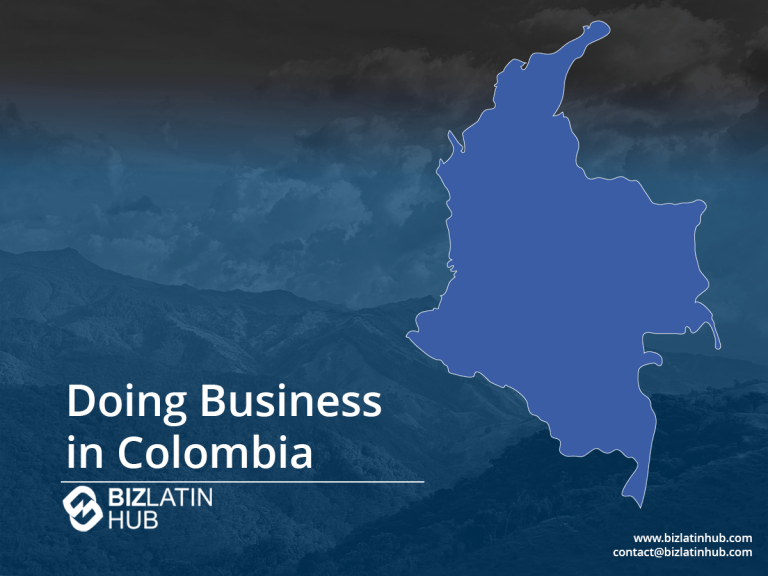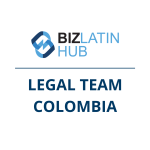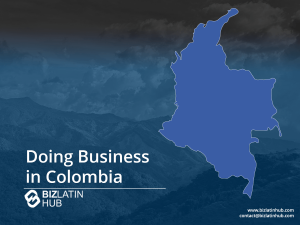Colombia is becoming one of the most attractive destinations for trade in Latin America. The convergence of a stable government, strategic free trade agreements, sound economic policies and declining insecurity have propelled the country to the forefront of economic leadership in the Latin American region. As a result, there is growing interest among foreign investors in doing business in Colombia.
With its favorable business environment and promising economic outlook, Colombia presents a wealth of opportunities for entrepreneurs and companies looking in doing business in Colombia. Whether you are exploring new markets or looking to expand your existing operations, Colombia offers an attractive prospect for growth and prosperity when doing business in Colombia.
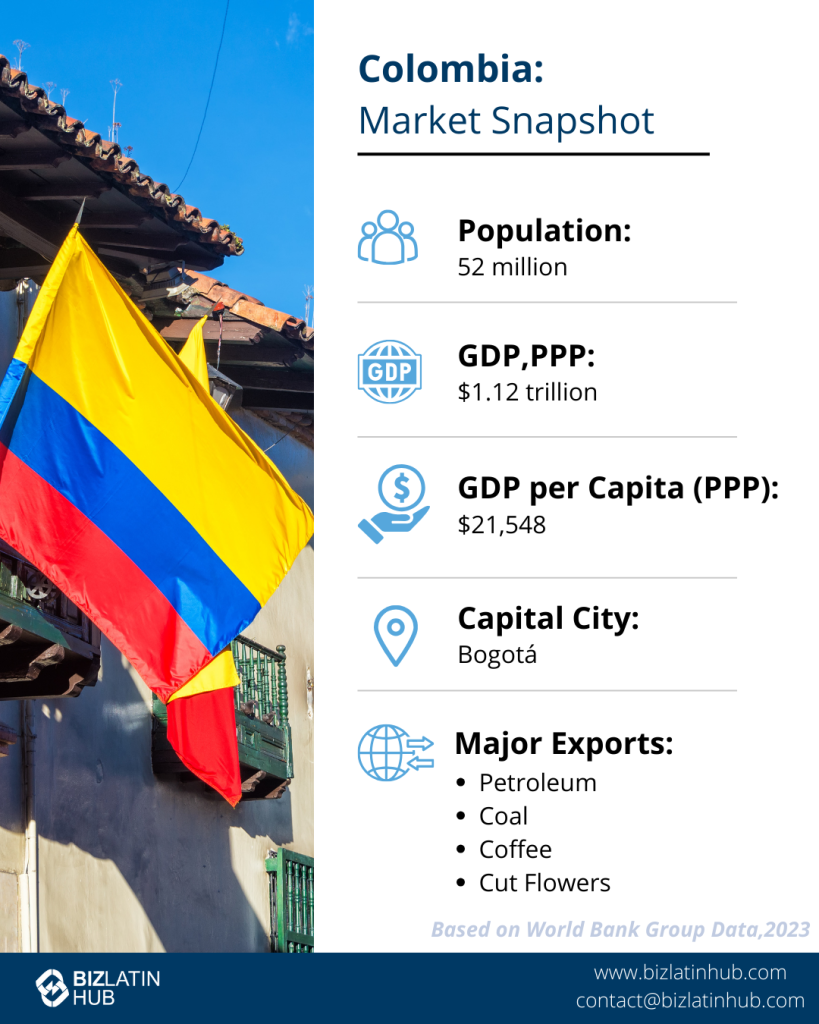
Colombia has emerged as one of Latin America’s prime destination for start-ups, business expansion, foreign entrepreneurs and medical tourism. A tremendous variation in investment opportunities makes thorough, industry-specific market research and in-depth analysis of the investment landscape crucial. With that in mind, many potential investors benefit from the in-depth understanding of doing business in Colombia that a locally-based partner such as Biz Latin Hub can provide.
The 4 thoughts for foreigners who are planning on doing business in Colombia are:
- Employment law.
- Cash economy.
- Language barrier.
- Local customs.
1. Doing Business in Colombia: Employment Law
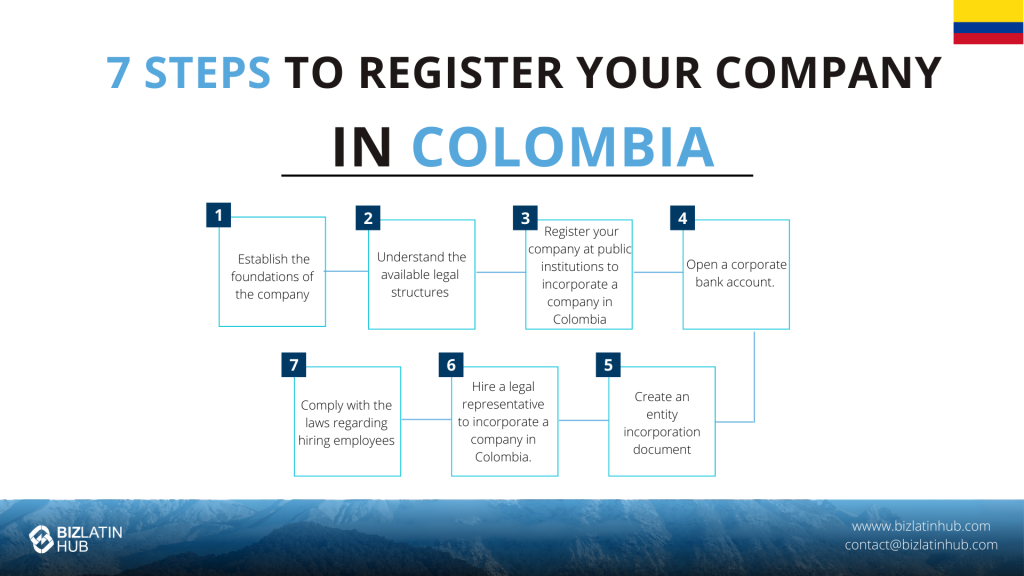
Colombian employment laws highly favor employees regardless of the context. Full background checks should always be completed before hiring at any level, and employment contracts should be carefully structured with the advice of qualified lawyers. The Colombian welfare system does not provide unemployment benefits, and any organization that fires an employee is liable to cover their costs if a complaint about unjustified dismissal is lodged. Outsourcing the recruitment process to an employment agency is a cost-effective way of avoiding potential and unnecessary legal and financial burdens of doing business in Colombia.
2. Cash Economy
Informality remains a driving force of the Colombian economy, and a significant proportion of the population does not have a bank account or own credit cards. Meanwhile, Colombian interest rates are high, making it very expensive for Colombians to secure bank loans. Both factors should be taken into account when developing a business model.
3. Language Barrier
Unlike some other Latin American countries, English is not widely spoken in Colombia, making a locally-based partner critical to the success of anyone who wants to invest that doesn’t speak Spanish. Because while English might be a common language for doing business in Colombia, Spanish helps build understanding and strong relationships.
4. Doing Business in Colombia: Local Customs
Colombians are known for being good negotiators and doing deals in the country often involves significant bartering and exchange, so the phrase non-negotiable is not always well-understood. Being aware of such quirks and customs can be essential to striking a good deal and doing business in Colombia.
4 Types of Company Formations in Colombia
Colombian law recognizes various forms of business entities, but the most common ones are:
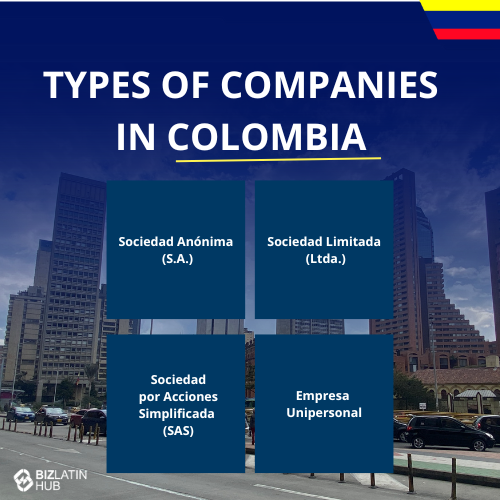
- Sociedad Anónima (S.A.): This type of company is similar to a public limited company (PLC). It requires at least five shareholders and a minimum capital contribution of 100 times the monthly legal minimum wage.
- Sociedad Limitada (Ltda.): This is similar to a limited liability company (LLC) in other countries. It requires at least two partners and a minimum capital contribution of 100 times the monthly legal minimum wage.
- Sociedad por Acciones Simplificada (SAS): This is a simplified stock corporation designed to provide a more straightforward and faster incorporation process compared to the traditional S.A. and Ltda. companies. It requires at least one partner and has no minimum capital requirements. In our experience, this is what we almost always recommmend.
- Empresa Unipersonal: This is a sole proprietorship, where the business is owned by a single individual. There is no minimum capital requirement, and the owner is responsible for all obligations of the business.
FAQs on doing business in Colombia
Answers to some of the most common questions we get asked by our clients.
1. Can a foreigner own a business in Colombia?
Yes, a business can be 100% foreign-owned by either legal persons (legal entities) or natural persons (individuals).
2. How long does it take to register a company in Colombia?
In our experience, registering a company in Colombia takes around four weeks.
3. What does an LTDA company name mean in Colombia?
LTDA in a company name in Colombia refers to a Sociedad de Responsabilidad Limitada, which is similar to a Limited Liability Company. This type of corporate structure is characterized by the partners’ liability being limited to their contributions to the company’s capital.
In an LTDA, partners are not personally responsible for the company’s debts beyond their investment, providing a level of protection for individual assets. Small to medium-sized businesses frequently use it in Colombia because it combines elements of partnership and corporate structures, providing flexibility and legal protections.
4. What does an S.A.S company name mean in Colombia?
S.A.S means Sociedad por Acciones Simplificada, which is similar to a Joint Stock Company. This is a type of commercial company with legal presence and assets independent from those of its owners. Shareholders are liable only up to the amount of their respective contributions corresponding to the integration of the shares they subscribe to or acquire. Shareholders are not liable for labor, tax, or any other type of obligations incurred by the company beyond its contribution, except if the legal presence of the company is declared unenforceable.
5. What entity types offer limited liability in Colombia?
Both the Sociedad por Acciones Simplificada (S.A.S) and Sociedad de Responsabilidad Limitada are Limited Liability Companies in Colombia.
Biz Latin Hub can assist you doing business in Colombia
At Biz Latin Hub, our multilingual team of corporate support specialists has the knowledge and expertise to support you doing business in Colombia. Our comprehensive portfolio of services, including company formation, accounting, tax advisory, and hiring & PEO, means we can provide tailored packages of integrated back-office solutions.
We can be your single point of contact for doing business in Colombia, or any of the other 17 markets around Latin America and the Caribbean where we have local teams in place.
Contact us now to discuss how we can support your business.
Or learn more about our team and expert authors.

